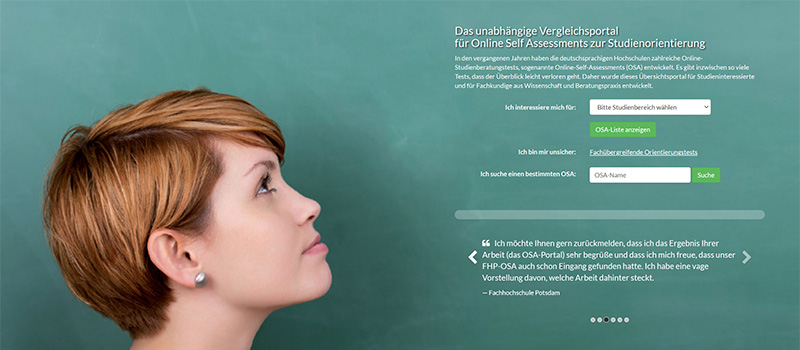Do you remember? Towards the end of your time at school when you could actually see when you would “finally” be finished, you were inevitably faced with a big question: what now? Travel around the world for a year? Spend a year helping the community as a volunteer? Or should you start training or studying straightaway? That decision alone requires careful consideration. Those who decide on the latter option – studying – then immediately face the next choice: what do I want to study? Which degree course is right for me?
In 2021, over 470,000 (young) people decided to begin their studies. So you’re in good company: although the number of students is slightly on the decline at the moment, at almost 3,000,000 students (Association of Universities and other Higher Education Institutions in Germany [HRK], 2021) the total number is still immense. If nothing else, the question of which degree course to choose is not an easy one to answer because it is scarcely possible to take in the wealth of possible options (Petri & Kersting, 2022b). According to an HRK report (2021), the offering of fields of study at the state universities, the state universities of applied sciences and the private universities has almost doubled to nearly 21,000 (undergraduate and postgraduate) degree programmes in the last 15 years. These include over 9,000 undergraduate degree programmes alone (Bachelor’s degree qualification).
How do I know what degree course is right for me?
Choosing a degree course is a big challenge. It is therefore advisable to take your time in making that decision. In addition to informal conversations with family, friends and acquaintances, etc., it is worth taking up offers by advisory services. Both the universities themselves and other institutions, such as the Employment Agency (Agentur für Arbeit), for instance, offer advice and support in a wide variety of formats. Online Self-Assessments (OSA) are very low-threshold offerings provided by a large number of universities.
What are OSAs exactly?
OSAs are online tools that are generally used in a university context to help people interested in studying on their way towards making an informed decision about which degree course to choose. They are provided free of charge as a constant resource that can be used anonymously online and offer both information elements and psychometric tests and questionnaires that are to be used to record attributes relevant to aptitude (Petri, Schütte & Beauducel, 2022). Anyone who has no idea what they are interested in yet should adopt an exploratory approach to the matter for the time being and use relevant OSAs. On the was-studiere-ich.de portal, for example, you can get information on degree programmes that might appeal to you based on your personal profile (leanings and skills). Those who already have their eye on a particular degree subject or a couple of subjects (“degree course of choice”) can use what are called confirmatory OSAs: domain-specific OSAs like this are developed in close consultation with the respective representatives from that field and are mostly specific to the university. They offer the opportunity to clarify whether the potential degree course of choice is really right for you and whether your own ideas about this course are actually realistic or not. The OSA-Portal, for example, provides an extremely comprehensive overview of OSAs from a wide variety of universities that are sorted by subject and are in German.

What can students expect in an OSA?
When they use an OSA, people interested in studying can get detailed information about their potential degree course of choice, test the extent to which they meet the requirements for gaining a degree qualification and whether their expectations of the degree course are realistic, and they can do this in a secure space. OSAs typically include questionnaires on characteristics relevant for studying, interests, previous knowledge, expectations and tests – tests of deductive reasoning, for example. In addition, they include information on the field of study and the university.
Using an OSA can take between 45 minutes and way over an hour depending on its scope and how fast you work through it. Whatever the case, it is “time well invested”: working through it properly and assiduously contributes to the robustness of the information you provide in the OSA (e.g. in the self-assessment questionnaire or tests). This results in feedback that is relatively significant.
What can students expect from an OSA?
After the OSA has been processed, you get feedback on your results from the individual elements of the OSA – mostly tests and questionnaire – and on what that means with regard to your aptitude for studying. Many OSAs provide the option of exporting the feedback, which is sometimes very detailed. This means that it can be saved locally so that you can access it again at a later date.
The feedback generally addresses the question of the fit of the degree course of your choice. Fit means the extent to which the abilities, skills, relevant previous knowledge, other characteristics relevant for studying, and your individual profile with regard to interests match the field of study. The idea here is that the greater the fit between the person (interested in studying) and the environment (field of study at the respective university), the more likely the respective person is to be content with their studies and obtain their degree qualification (Heublein et al., 2017; Nye, Su, Rounds & Drasgow, 2017; Stoll, 2013; Zimmerhofer, 2008). That means that you should specifically draw on this fit as an important criterion for choosing your own degree course – also based on the feedback from one or more OSAs that you have completed.
Furthermore, OSAs can be supportive in nature: if specific previous knowledge or a certain level of skill in foreign languages are already required at the start of your studies, this can be tested in the OSA. If you do not meet the necessary requirements at the time you work through the OSA, you can specifically be referred to preparatory courses or other options for further development. That way, any “gaps” you may have can be identified and you have the option of going about achieving the required level by filling in gaps in your knowledge even before you apply for a place at university. It is also conceivable that by using an OSA you might find out that your own idea of your “degree course of choice” is unrealistic. This should prompt you to think about the adjusted expectations. You either stick by your desire to start this degree course because you may even have discovered new sides to the field that have piqued your interest even more when working through the OSA, or you realise that your own ideas actually point in a different direction, so you change tack. In both cases there is a benefit to using the OSA: it inspires self-reflection and you can make a (more) informed decision as to which degree course to choose or you are encouraged to explore a little further after all before choosing a degree course so that the decision you make is a good one.
What do universities expect from an OSA?
From the universities’ point of view, OSAs are attractive: as an economic and low-threshold online tool they can enrich the landscape of advice and support offerings available to students. It is a good idea, for example, for people interested in studying to work through one or more OSAs and – if they still have questions – to make use of a personal advice session one on one afterwards. The feedback from the OSA can even be directly incorporated here. The results can be discussed with an adviser and you can sound out which field could be considered as a possible alternative. If the OSA does not already contain (further) information on admission procedures that may exist, you can also find that out. So if future students also choose their field of study based on the feedback from one or more OSAs and are more informed regarding the requirements, it would be logical to assume that fewer students would withdraw from university shortly after beginning their studies as a result of dashed expectations. To be specific, false expectations would ideally be revealed when an OSA was used, so that OSA users would already have a realistic idea of the degree course before they applied and would hence be less likely to suffer disappointment. In turn, low withdrawal rates are desirable for universities. The fact that OSAs are well regard by the target group is shown by evaluation studies analysing acceptance among those interested in studying (Ott, Ulfert & Kersting, 2017; Petri & Kersting, 2022b).
Furthermore, if used by many people interested in studying, the OSA offering can also contribute to an increase in what is called the basic rate among applicants. That means that the percentage of people in the group of applicants who are actually suitable increases (Stoll, 2023). This is a result of the fact that people who are not very suitable for a certain degree course find this out themselves in the OSA and may decide not to apply (for the time being).
What else can OSAs achieve?
Lastly, it needs to be said that OSAs can do much, much more. In no way is the idea of a low-threshold online offering only suitable for people interested in studying. The OSA concept can also be applied expediently to new students (in the first two semesters). It is common knowledge that most withdrawals from university are recorded in the first two semesters (Heublein et al., 2017; Heublein, Richter & Schmelzer, 2020). In the first year of their studies, students have to find their way in the new academic environment and are confronted with many challenges: putting together their own timetable, organising exam revision, taking responsibility themselves for revising during the semester and keeping their eye on deadlines, making friends and acquaintances, “arriving” in their new city and much more. It can be the case that people suitable for the respective degree course may need a bit of help generally with one thing or another (Petri, 2021). The only problem is this: you often don’t even know what great offers of support there are or where to find them, particularly in this introductory phase. And sometimes you perhaps don’t have any idea what “the problem” is yourself or know what could be helpful.
That is where OSAs come in: as piloted at Justus Liebig University Giessen (JLU), an OSA can be a low-threshold (online and anonymous) offering for new students so that they can reflect on themselves and their own start at university (Petri & Kersting, 2022a). A very wide range of topics was covered at JLU using various questionnaire tools, from social integration and perceived stress to organising of revision, academic research and writing, and foreign language skills. In a brief screening process you could decide freely which topic you wanted to work through (under 10 minutes’ time for processing per topic) and received direct feedback as to whether your own information yielded “noticeable” results compared to other students, which could indicate that you needed support. If that was the case, concrete offerings of support were displayed that matched the information and the topic individually.
Conclusion: OSAs as a useful tool on the way towards making an informed decision about which degree course to choose
OSAs are an attractive concept for both universities and those interested in studying: people interested in studying can receive low-threshold support with making an informed decision about which degree course to choose. In turn, with the help of OSAs universities can extend their landscape of advice and support offerings and contribute to increasing the basic rate in the medium term and reducing the withdrawal rates in the long term.
What has your own experience been regarding the topic of choosing a degree course and, if applicable, regarding the use of OSAs even? Use the comment function to join the discussion!
References
Heublein, U., Ebert, J., Hutzsch, C., Isleib, S., König, R., Richter, J. et al. (2017). Zwischen Studienerwartungen und Studienwirklichkeit. Ursachen des Studienabbruchs, beruflicher Verbleib der Studienabbrecherinnen und Studienabbrecher und Entwicklung der Studienabbruchquote an deutschen Hochschulen. Hannover: DZHW.
Heublein, U., Richter, J. & Schmelzer, R. (2020). Die Entwicklung der Studienabbruchquoten in Deutschland. https://doi.org/10.34878/2020.03.DZHW_BRIEF
Hochschulrektorenkonferenz. (2021). Statistische Daten zu Studienangeboten an Hochschulen in Deutschland – Studiengänge, Studierende, Absolventinnen und Absolventen. Wintersemester 2021/2022. Berlin.
Nye, C. D., Su, R., Rounds, J. & Drasgow, F. (2017). Interest congruence and performance: Revisiting recent meta-analytic findings. Journal of Vocational Behavior, 98, 138–151. https://doi.org/10.1016/j.jvb.2016.11.002
Petri, P. S. (2021). Neue Erkenntnisse zu Studienerfolg und Studienabbruch. Einblicke in die Studieneingangsphase (Hochschulwesen, Bd. 42, 1. Auflage). Bielefeld: UVW Universitäts Verlag Webler.
Petri, P. S. & Kersting, M. (2022a). OSA für Studieneinsteiger*innen – Überblick zum (neuen) förderdiagnostischen Konzept der JLU Gießen inklusive einer Checkliste zur praktischen Umsetzung. https://doi.org/10.5281/zenodo.7110566
Petri, P. S. & Kersting, M. (2022b). Wer nutzt und wem nutzen OSA? Manuskript eingereicht zur Publikation.
Petri, P. S., Schütte, N. & Beauducel, A. (2022). Mit OSA erfasste Personenmerkmale und deren Interaktion mit OSA-Rückmeldungen und Informationselementen. In G. Stoll & S. Weis (Hrsg.), Online-Self-Assessments zur Studienfachwahl. Entwicklung – Konzepte – Qualitätsstandards. Berlin: Springer.
Stoll, G. (2013). Entwicklung und Validierung eines Interessentests zur Berufs- und Studienfachwahl. Dissertation. Saarbrücken.
Stoll, G. (2023). Anregung zur Selbstselektion und Steigerung der Grundquote – Welchen Beitrag leisten Online Self-Assessments im Kontext der Studierendenauswahl? Manuskript eingereicht zur Publikation.Zimmerhofer, A. (2008). Studienberatung auf der Basis psychologischer Tests: Studienfachprofile, Vorhersagevalidität und Akzeptanz. VDM-Verlag Müller.
Suggestion for citation of this blog post
Petri, P. S. (2023, March 23). Spoilt for choice? How Online Self-Assessments can help you choose what to study. Lehrblick – ZHW Uni Regensburg. https://doi.org/10.5283/zhw/20230323.EN

Pascale Stephanie Petri
Dr. Pascale Stephanie Petri (Psychologist, MSc) did her PhD on the topic of academic success and student withdrawal. She was awarded a dissertation prize for her PhD thesis from Justus Liebig University Giessen (JLU) in November 2021.As an assistant professor, she worked on the Online Self-Assessment “Ready for Justus” from 2016 to 2021, an online tool intended to help people interested in studying with self-reflection regarding their aptitude for studying. She has been teaching at the Chair of Psychological Diagnostics in both the BSc and MSc degree programmes in Psychology since 2017.





